How customer care boosts referrals—and profits.
It’s unlikely that your customers will defect to a competitor if you are delivering the four elements of making customers happy that I outlined last month — on-time delivery, quality work, ethical corporate behavior, and convenience. Satisfied customers know that by switching, they’re taking a risk. But if you want to move those customers to the next level of loyalty — having them tell their family and friends about you — you must care for them.
Customer care means that you and your co-workers treat customers or prospective customers in such a way that they sense that you are concerned about them and their comfort— not just with selling them products or services.
Customer care is all about empathy and begins with hiring. Some people are by nature more empathic and are better able to convey to customers that they care about them. To be certain that you hire empathic people for the retail business, determine the candidate’s level of empathy by conducting a personal behavioral profile. If you realize the role empathy plays in customer care and staff accordingly, your company will excel at providing customer care. It’s that simple.
A customer or prospective customer will sense your company’s level of customer care very soon after your customer service representative (CSR) picks up the phone. How many times did the phone ring before it was answered? Did an automated system or a person answer it? Using an automated system is not practicing empathy!
Imagine it is 95 degrees or 20 degrees outside, and a customer frantically is trying to find a company that will come and fix a cooling or heating system. To the customer, this is a major crisis. To your CSR, it cannot be just another service call in a long day filled with service calls. Regardless of how many service calls you have at the time or when you will be able to get to the customer’s home, the CSR must come across as if she or he really cares.
Customer care doesn’t mean that you can never make a mistake. Once you form a relationship with a customer, you have to mess up badly to lose him. In fact, you can mess up at least once if you find out about and fix the mistake quickly. Some of our very best customers were the ones where we did something wrong, found out about it, then quickly apologized and corrected the problem. Those customers became our strongest supporters because we demonstrated that although we were not perfect, we were fair, honest, and took proper and quick corrective action. We showed them that we cared. (Incidentally, for you creative marketing folks: I am not advocating that you implement a plan whereby you intentionally mess something up for your customers so you can quickly impress them by correcting it.)
After you deliver a product or service to a customer, he or she can have any one of four impressions:
1) Angry. Usually, customers quickly let you know. Of course, in the meantime, they will let many more folks know as well.
2) Dissatisfied. Often, they do not tell you, but they will tell other people. Many times, they just find another provider. Think about what you’ve done when you’ve had a bad experience at a restaurant. Like me, you probably just paid the bill, went back home, decided that you would never go there again, and then told your friends and neighbors that they would not want to go there either. I often have wondered how many people those 12 people tell. Is it possible that the entire community knows within a couple of weeks? (In September’s issue, Susan Hart wrote about performing happy calls, an excellent way of identifying angry or dissatisfied customers (see www.hvacrbusiness.com for past articles).
3) Satisfied. Most companies are trying to satisfy their customers, but that is not enough. A satisfied customer is one who receives exactly what he or she was told — no more and no less. A satisfied customer will stay with your company but has no reason to get excited and tell anyone else about it.
4) More than satisfied. When customers receive more than they were told they would get and what they expected, they will tell other people of their happy experiences. Companies who believe in and practice customer care automatically deliver more than the customer expects and, as a result, have more-than-satisfied customers.
In marketing, this principle of more than-satisfying-your-customers also is called “added value.” Delivering added value does not have to be expensive.
To add value after installing a replacement equipment system, fill out and price a one-year service agreement, sign it, mark it no charge, have the customer sign it, and hand back a copy. You could install an empty electronic air cleaner cabinet in case the customer ever would want to invest in a cleaner. At the very least, you could leave a supply of air filters. To add value on service calls, your technician could offer to verify that the customer’s smoke alarms are working and if required, install a new battery. During the winter holidays, our service and maintenance technicians would ask customers if they wanted us to get their Christmas decorations out of storage. You and your co-workers could have a fun discussion coming up with many ways to practice customer care and to deliver more than your customers expect. By caring for your customer this way, you will have more-than-satisfied customers who will happily refer family, friends, and neighbors to your company.
Ron Smith is a well-known authority in the hvacr business with more than 45 years of experience as a contractor, franchisor, consolidator, and consultant. He is the author of HVAC Spells Wealth and HVAC Light Commercial Service Agreements.




.webp)
